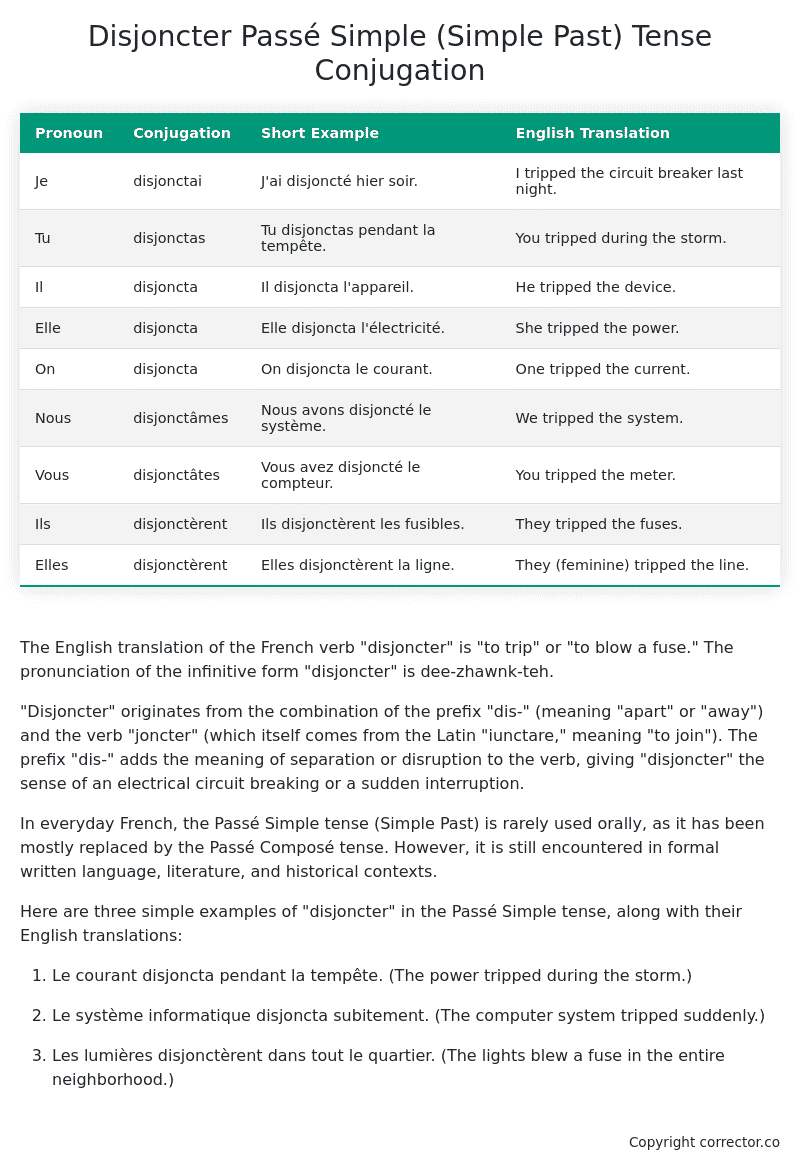Passé Simple (Simple Past) Tense Conjugation of the French Verb disjoncter
Introduction to the verb disjoncter
The English translation of the French verb “disjoncter” is “to trip” or “to blow a fuse.” The pronunciation of the infinitive form “disjoncter” is dee-zhawnk-teh.
“Disjoncter” originates from the combination of the prefix “dis-” (meaning “apart” or “away”) and the verb “joncter” (which itself comes from the Latin “iunctare,” meaning “to join”). The prefix “dis-” adds the meaning of separation or disruption to the verb, giving “disjoncter” the sense of an electrical circuit breaking or a sudden interruption.
In everyday French, the Passé Simple tense (Simple Past) is rarely used orally, as it has been mostly replaced by the Passé Composé tense. However, it is still encountered in formal written language, literature, and historical contexts.
Here are three simple examples of “disjoncter” in the Passé Simple tense, along with their English translations:
-
Le courant disjoncta pendant la tempête.
(The power tripped during the storm.) -
Le système informatique disjoncta subitement.
(The computer system tripped suddenly.) -
Les lumières disjonctèrent dans tout le quartier.
(The lights blew a fuse in the entire neighborhood.)
Table of the Passé Simple (Simple Past) Tense Conjugation of disjoncter
| Pronoun | Conjugation | Short Example | English Translation |
|---|---|---|---|
| Je | disjonctai | J’ai disjoncté hier soir. | I tripped the circuit breaker last night. |
| Tu | disjonctas | Tu disjonctas pendant la tempête. | You tripped during the storm. |
| Il | disjoncta | Il disjoncta l’appareil. | He tripped the device. |
| Elle | disjoncta | Elle disjoncta l’électricité. | She tripped the power. |
| On | disjoncta | On disjoncta le courant. | One tripped the current. |
| Nous | disjonctâmes | Nous avons disjoncté le système. | We tripped the system. |
| Vous | disjonctâtes | Vous avez disjoncté le compteur. | You tripped the meter. |
| Ils | disjonctèrent | Ils disjonctèrent les fusibles. | They tripped the fuses. |
| Elles | disjonctèrent | Elles disjonctèrent la ligne. | They (feminine) tripped the line. |
Other Conjugations for Disjoncter.
Le Present (Present Tense) Conjugation of the French Verb disjoncter
Imparfait (Imperfect) Tense Conjugation of the French Verb disjoncter
Passé Simple (Simple Past) Tense Conjugation of the French Verb disjoncter (You’re reading it right now!)
Passé Composé (Present Perfect) Tense Conjugation of the French Verb disjoncter
Futur Simple (Simple Future) Tense Conjugation of the French Verb disjoncter
Futur Proche (Near Future) Tense Conjugation of the French Verb disjoncter
Plus-que-parfait (Pluperfect) Tense Conjugation of the French Verb disjoncter
Passé Antérieur (Past Anterior) Tense Conjugation of the French Verb disjoncter
Futur Antérieur (Future Anterior) Tense Conjugation of the French Verb disjoncter
Subjonctif Présent (Subjunctive Present) Tense Conjugation of the French Verb disjoncter
Subjonctif Passé (Subjunctive Past) Tense Conjugation of the French Verb disjoncter
Subjonctif Imparfait (Subjunctive Imperfect) Tense Conjugation of the French Verb disjoncter
Subjonctif Plus-que-parfait (Subjunctive Pluperfect) Tense Conjugation of the French Verb disjoncter
Conditionnel Présent (Conditional Present) Tense Conjugation of the French Verb disjoncter
Conditionnel Passé (Conditional Past) Tense Conjugation of the French Verb disjoncter
Conditionnel Passé II (Conditional Past II) Tense Conjugation of the French Verb disjoncter
L’impératif Présent (Imperative Present) Tense Conjugation of the French Verb disjoncter
L’impératif Passé (Imperative Past) Tense Conjugation of the French Verb disjoncter
L’infinitif Présent (Infinitive Present) Tense Conjugation of the French Verb disjoncter
L’infinitif Passé (Infinitive Past) Tense Conjugation of the French Verb disjoncter
Le Participe Présent (Present Participle) Tense Conjugation of the French Verb disjoncter
Le Participe Passé (Past Participle) Tense Conjugation of the French Verb disjoncter
Struggling with French verbs or the language in general? Why not use our free French Grammar Checker – no registration required!
Get a FREE Download Study Sheet of this Conjugation 🔥
Simply right click the image below, click “save image” and get your free reference for the disjoncter Passé Simple tense conjugation!

Disjoncter – About the French Passé Simple (Simple Past) Tense
Formation
Usage
Narration
Historical Context
Interactions with other tenses
Passé Composé
Imparfait
Conditional and Subjunctive
Summary
I hope you enjoyed this article on the verb disjoncter. Still in a learning mood? Check out another TOTALLY random French verb conjugation!


